EU Commission boss: Who will replace Jean-Claude Juncker?
Marathon talks among EU leaders in Brussels have so far failed to produce agreement on a candidate to replace European Commission President Jean-Claude Juncker. The contest is still wide open.
Mr Juncker, at the helm of EU business since 2014, is to pass on the baton at the end of October. "I am glad to see that I am not easy to replace," he chuckled in response to the delayed decision.
The European Council - the EU government leaders - were meeting again on Tuesday with hopes of a breakthrough. Meanwhile, newly-elected MEPs were also meeting in Strasbourg.
The May European elections left the 28-nation bloc's parliament more fragmented, complicating decision-making.
The role of Commission president, whose candidacy requires parliamentary approval, proposes new EU laws, enforces the bloc's rules and handles trade deals. So who might run it, based on what we know so far?
Margrethe Vestager, Liberals
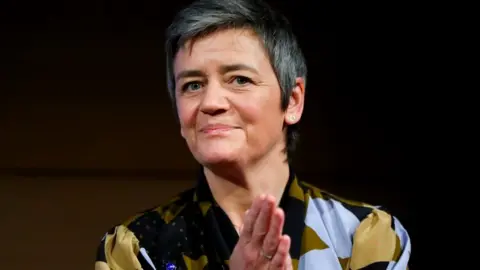 Getty Images
Getty ImagesFor: A big name in Danish politics, Ms Vestager has spent the past five years as competition commissioner, spearheading EU anti-trust investigations that have ended in big fines for technology giants Google and Apple.
Her battle to protect consumers and make large firms pay earned her the wrath of US President Donald Trump last year, who is reported to have told Mr Juncker following news of the hefty fines: "Your tax lady, she really hates the US."
Ms Vestager is certainly causing a buzz and the liberal group, now called Renew Europe, gained ground in the elections, partly thanks to the arrival of President Macron's party.
Against: She may struggle to win support from the biggest group in parliament, the centre-right European People's Party. And she risks being dropped if the European Council decides that the "Spitzenkandidaten" race of lead candidates cannot work. She is one of three Spitzenkandidaten put forward by the European Parliament - along with Manfred Weber of the centre right and Frans Timmermans of the centre left.
German Chancellor Angela Merkel is quoted as saying that if EPP choice Manfred Weber is ditched, then Mr Timmermans and Ms Vestager are ruled out too.
What she says: "I have worked with breaking monopolies. This is also what voters have been doing. The monopoly of power is broken," she declared after the elections that broke the majority of the two big centre-right and centre-left blocs in the European Parliament.
Frans Timmermans, Party of European Socialists
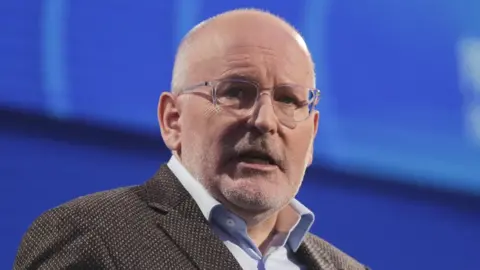 EPA
EPAFor: Frans Timmermans has the wind in his sails, having led the Dutch centre-left Labour party to a dramatic, unexpected victory in the European elections, winning 19% of the vote on the back of a pro-European campaign.
The First Vice-President of the European Commission emerged as front-runner during the marathon talks in Brussels. He helped steer through EU legislation banning plastic straws and negotiated the EU's 2016 deal with Turkey to reduce the flow of migrants.
He was lampooned by political opponents as Eurocrat "Hans Brusselmans"; but the negative message failed and the multi-lingual Labour leader took advantage of his election campaign to push for the Commission presidency.
Against: He is disliked in Poland, Hungary and Romania for challenging their governments over rule of law, and Czech Prime Minister Andrej Babis said his candidacy was "unacceptable for us, it would be a total catastrophe". Italy has also opposed him.
What he says: Warning of the risks of nationalism he said last month: "People who used to vote for my party and many parties here are now voting for nationalist parties, sometimes even extremist parties. That's our fault," he said. He also spoke of Brexit as leaving the UK looking like "Game of Thrones on steroids".
His latest policy proposals for the bloc include a minimum EU-wide rate of corporation tax of 18%, and the implementation of a minimum wage in every member state.
Manfred Weber, European People's Party
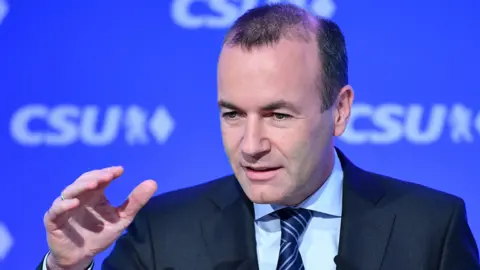 EPA
EPAFor: A high-flyer in the EPP, the 46-year-old Bavarian's candidacy has been endorsed by Chancellor Merkel and he has led the EPP since 2014.
Against: The EPP lost ground in the elections and Mr Weber, initially a favourite, seems all but out of the race as the liberals and socialists say they will not back him. Critics question his qualifications for the top EU job; he has never held a government post.
At the summit, French President Emmanuel Macron said all three lead candidate names were "tested" and "there was no majority". Greece's socialist Prime Minister Alexis Tsipras declared that Mr Weber's candidacy had divided Europe and was "off the table".
What he says: He has advocated strengthening security across the bloc and protecting the "European way of life". In a Twitter post in November, which featured a promotional video, he wrote: "Here and everywhere else people are asking us to bring Europe back home."
He has promised to appoint a commissioner to oversee a new relationship with Africa to help control migration to Europe, and has said that future trade deals with other countries should include clauses banning child labour.
Ska Keller of the Greens
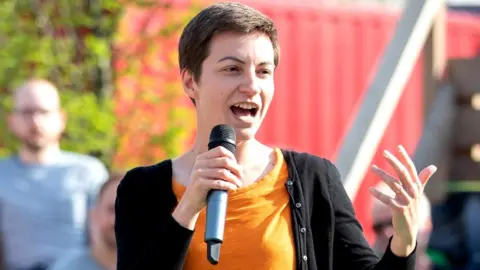 EPA
EPAFor: After the Green surge in the May elections, her group is now the fourth biggest in the European Parliament and environmental issues are at the heart of the EU's agenda for the next five years. In her home country, Germany, the Greens now top the opinion polls.
Ska Keller stood as Green "Spitzenkandidat" in 2014, and is as focused on the rights of migrants as on the environment.
She became an MEP in 2009 at the age of 27 and has said that, while she aims to represent everybody, young people in particular need a louder voice in Europe. She has a masters in Islamic Studies, Turkology and Jewish Studies.
Against: Up against the other candidates, Ms Keller is likely to struggle to find the support of enough member states. Poland, the Czech Republic and Hungary - heavily reliant on coal - are resisting the green ambitions of many EU partners.
What she says: Ska Keller wants to tackle climate change but not through banning air travel. "If trains become cheaper and better, we'll make short-haul flights redundant."
Michel Barnier, EU chief Brexit negotiator
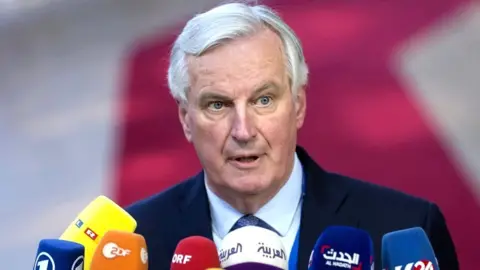 Getty Images
Getty ImagesFor: He may not be a candidate, but few EU figures have had a profile as dominant as this 68-year-old former French foreign minister, who succeeded in keeping 27 countries on the same page during the bloc's Brexit negotiations with the UK.
He is admired by President Macron, who said he was "one of the European leaders that have eminent qualities and can be on the list [of candidates for EU top jobs]".
Against: Once said by former French President Nicolas Sarkozy to possess the "charisma of an oyster", Mr Barnier is known for choosing his words carefully and has a precise manner when addressing leaders - often with a formidable stare.
He is also known for backing the legacy of post-war President Charles de Gaulle, who advocated a centralised economy, powerful presidency and independent foreign policy.
What he says: "Now more than ever, we Europeans need collective action in defence of our values and a rules-based international order. This could be Europe's moment, based on a more robust and decisive European Union." (January 2019 opinion piece)
Mark Rutte, Liberals
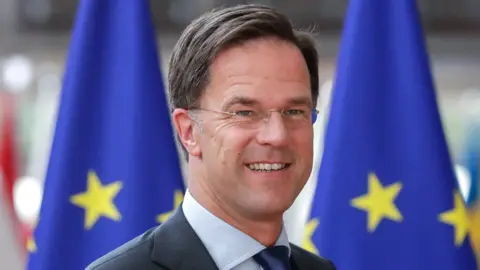 EPA
EPAFor: The Dutch prime minister is a head of government - a definite advantage in the contest for either the role of Commission chief or European Council president. He is also a liberal, and his group boosted their numbers in the European elections.
The EU is also anxious about the economic impact of Brexit, and the Netherlands is one of the UK's closest partners, so Mr Rutte could score political points there, as a safe bet for avoiding a collision with the UK. He has warned that Brexit will "diminish" the UK's status internationally.
Against: He is backing Margrethe Vestager who, as a liberal woman from one of the smaller EU nations, is seen as a strong candidate. He has expressed no interest in getting the Commission president job. There is already a prominent Dutch "Spitzenkandidat" and EU veteran in the race - Frans Timmermans.
What he says: "I'm staying in the Netherlands. I already have a top post: prime minister of the Kingdom of the Netherlands and being a member of the European Council. And I love it."
Dalia Grybauskaite, Lithuanian President
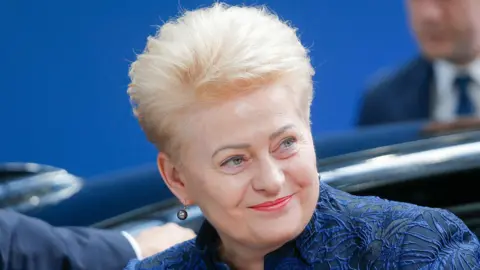 AFP
AFPFor: The 63-year-old, a political independent, has served two consecutive terms as Lithuania's president. She served as EU budget commissioner in 2004-2009, so she has plenty of experience of EU business. Her presidential term ends in July - good timing for a move to Brussels.
In terms of EU efforts to achieve gender and geographical balance, she has the advantage of being a woman from a small, eastern European state. She could be a compromise candidate, as she is not tied to any particular party.
Against: She is nicknamed "Steel Magnolia" for her tough stance on corruption and relations with Russia. The EU is keeping sanctions against Russia in place, condemning its annexation of Ukraine's Crimea region. But many EU countries depend on Russian gas, and Ms Grybauskaite's stance is unlikely to ease tensions with the EU's huge neighbour.
What she says: "My climb to political success was no elevator ride, and it has not always been pretty, but I persevered as one of a handful of women in the male-dominated world of politics."

